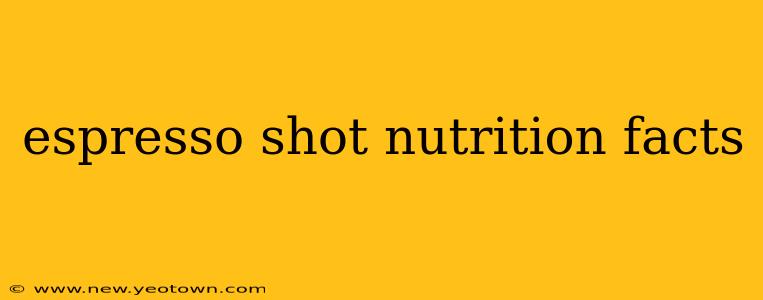The rich, dark elixir that jumpstarts millions of mornings – espresso. But beyond its invigorating aroma and bold flavor, what's actually in that tiny shot? Let's delve into the nutritional facts of an espresso shot and uncover some surprising details. This isn't just about calories; we'll explore the impact of espresso on your body, addressing common questions and concerns.
What are the calories in an espresso shot?
This is often the first question people ask. The good news? A single espresso shot (roughly 1 ounce) contains virtually no calories. We're talking about less than 5 calories, which is negligible in most diets. The minimal calorie content stems from the fact that espresso is essentially concentrated coffee brewed from roasted coffee beans, with no added sugars, creams, or syrups. It's the additions that truly inflate the calorie count – think lattes, cappuccinos, and other coffeehouse creations.
Does espresso have any nutritional value?
While not a nutritional powerhouse like, say, a kale smoothie, espresso does offer a small amount of nutrients. A single shot contributes trace amounts of riboflavin (vitamin B2) and potassium. However, these amounts are so small they're unlikely to significantly impact your daily nutrient intake. The primary benefit of espresso isn't its nutritional content but rather its stimulating effects.
Is espresso good for you? What are the health benefits?
The health benefits of espresso are mainly tied to the antioxidants found in coffee beans. These antioxidants have been linked to a reduced risk of several health problems, including type 2 diabetes, Parkinson's disease, and certain types of cancer. It's important to note that these are observational studies, and more research is needed to definitively establish a causal link. Moreover, the amount of antioxidants in a single espresso shot is relatively small compared to the amount found in a larger cup of coffee.
However, moderation is key. Excessive caffeine consumption can lead to anxiety, insomnia, and digestive issues.
How much caffeine is in an espresso shot?
The caffeine content in an espresso shot varies depending on factors like the type of beans, roasting level, and the brewing process. Generally, a single shot (1 ounce) contains between 60-75 milligrams of caffeine. This is significantly less than a large cup of brewed coffee, which can contain upwards of 400 milligrams.
Is espresso bad for your teeth?
The acidity of espresso can erode tooth enamel over time, particularly with frequent consumption. While enjoying your espresso, try rinsing your mouth with water afterward to help neutralize the acids.
Does espresso affect blood pressure?
Espresso, like other caffeinated beverages, can temporarily raise blood pressure. However, this effect is usually short-lived and generally less pronounced in individuals who regularly consume caffeine. People with hypertension should monitor their blood pressure and consider limiting their caffeine intake.
Conclusion: Enjoy in Moderation
Espresso, enjoyed responsibly, can be part of a healthy lifestyle. Its low calorie count and potential antioxidant benefits are attractive features. However, it's crucial to be mindful of caffeine intake and the potential impact on your individual health needs. Remember to listen to your body, and if you have concerns, consult with a healthcare professional.

